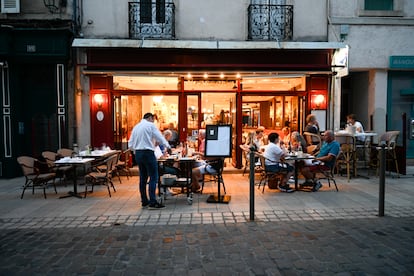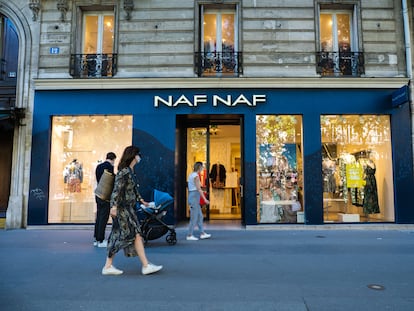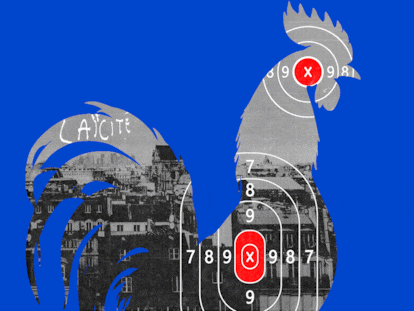Will opening new bistrots revitalize France’s dying countryside?
The National Assembly has approved a law that makes it easier to get a license to open a bar in communities with fewer than 3,500 residents and no local businesses

In France, there are 20,000 villages without a single store, not even a bar, which “are often the last survivors” in the gradual emptying out of the countryside, explains Guillaume Kasbarian, the member of the National Assembly who sponsored a bill seeking to streamline the procedures for obtaining a license to open a bistrot or café in communities with fewer than 3,500 residents and almost no services.
Over the course of 50 years, the number of bars has decreased fivefold: In the 1960s, there were around 200,000 such establishments in rural France, “which are also part of French culture.” Today there are fewer than 40,000. “There are places where nothing remains, and we see a clear need to open them, as they are an economic and social driving force,” explains Kasbarian, who belongs to the same political party as President Emmanuel Macron, Renaissance. The proposed law, which was voted on in late March in the Assembly and must now be validated by the Senate before being definitively approved, facilitates the creation of new “Type IV” licenses, which entrepreneurs need to open a bar where the sale of alcohol over 18 degrees is permitted.
The current legislation, which dates back to World War II, prohibits the creation of new licenses on the grounds of public health, to prevent alcohol consumption. Therefore, an entrepreneur wishing to open a bar can only do so by purchasing the license from someone who is closing down their own establishment. This “outdated law, ill-adapted to the current times,” restricts activity. According to the members of the Assembly, many cannot afford the cost of the permit, which varies depending on the size of the city. In small towns, it can be “around €7,000 or €10,000, while in large cities, it amounts to tens of thousands of euros.”
The new bill seeks to make the current regulations more flexible, allowing authorities to issue new, free licenses in areas with fewer than 3,500 inhabitants where there are currently no bars. “The goal is to simplify procedures for businesses and reduce bureaucracy in these less attractive areas, where it’s already difficult to establish a business,” explains Kasbarian.
This “will revitalize our rural areas and make life easier for entrepreneurs,” argued Trade Minister Véronique Louwagie in the debate in the Assembly. The chamber endorsed the initiative with the support of all political groups, despite initial reluctance from some left-wing MPs who argued that bars increase alcohol consumption. “This scourge is responsible for 41,000 premature deaths each year,” criticized MP Hendrik Davi of the environmental group. The left-wing party La France Insoumise fears that, taking advantage of this regulatory change, more bars will open in larger towns, where there is already a selection of establishments to choose from.
The alcohol issue
In rural areas, 80% of alcohol that is consumed is purchased in large stores and retailers. “Just because there isn’t a bar in town doesn’t mean people don’t drink, but rather that they buy alcohol at the store and consume it at home, while in an establishment, this consumption is more associated with socializing and having a good time,” argues Kasbarian, a former minister of housing who believes that bars play a certain “control role.” In small towns, bistros and bars “offer a multi-service model, which is essential for the population,” as they also sell newspapers, serve as delivery and collection points, and sell other types of products.
The margin that entrepreneurs make on the alcohol they sell is higher than on other products, which “allows these entrepreneurs to balance the model, so that their business can turn a profit. Without alcohol, the model would be loss-making.” The law still has to pass the Senate test and, if it does, is expected to come into force this summer. According to the French Association of Mayors, around 31,000 population centers with fewer than 3,500 residents (out of a total of 35,000) could benefit from this measure.
Sign up for our weekly newsletter to get more English-language news coverage from EL PAÍS USA Edition
Tu suscripción se está usando en otro dispositivo
¿Quieres añadir otro usuario a tu suscripción?
Si continúas leyendo en este dispositivo, no se podrá leer en el otro.
FlechaTu suscripción se está usando en otro dispositivo y solo puedes acceder a EL PAÍS desde un dispositivo a la vez.
Si quieres compartir tu cuenta, cambia tu suscripción a la modalidad Premium, así podrás añadir otro usuario. Cada uno accederá con su propia cuenta de email, lo que os permitirá personalizar vuestra experiencia en EL PAÍS.
¿Tienes una suscripción de empresa? Accede aquí para contratar más cuentas.
En el caso de no saber quién está usando tu cuenta, te recomendamos cambiar tu contraseña aquí.
Si decides continuar compartiendo tu cuenta, este mensaje se mostrará en tu dispositivo y en el de la otra persona que está usando tu cuenta de forma indefinida, afectando a tu experiencia de lectura. Puedes consultar aquí los términos y condiciones de la suscripción digital.

